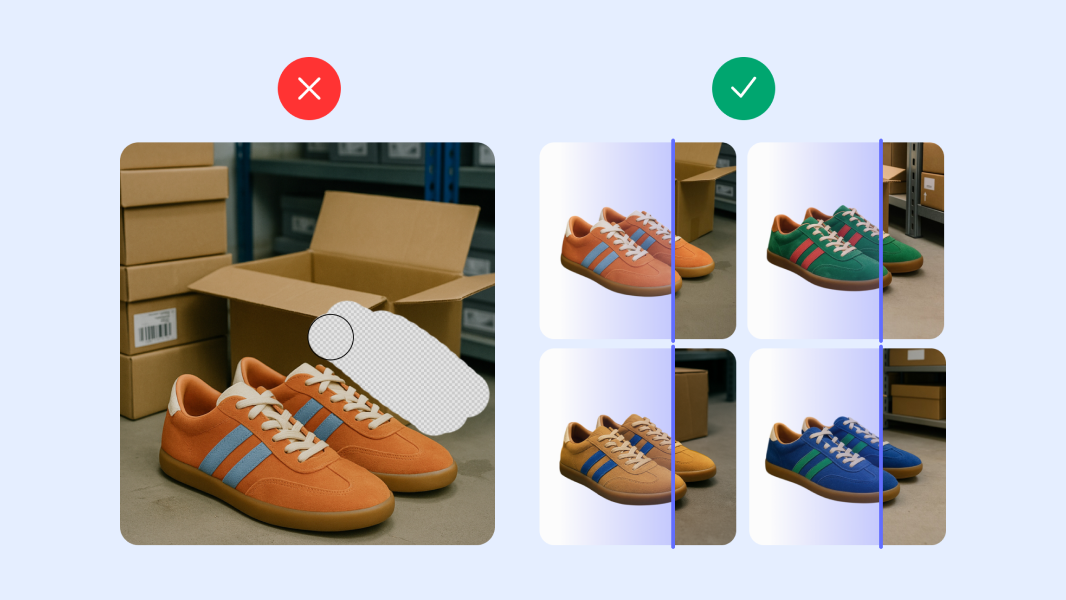The age of the entrepreneur: how human-centered AI is empowering financial freedom
Imagine being able to start a business with just your smartphone, no expensive tools, no technical training — just your passion and a few easy-to-use apps.
This isn’t a vision of the future; it’s happening now.
Thanks to technological advancements, including AI tools, ordinary people are transforming their side hustles into thriving businesses. Whether it’s a teen launching an e-commerce store from her bedroom or a reseller enhancing photos for their eBay listings, accessible AI tools like Photoroom, CapCut, Mailchimp, and ChatGPT, to name a few, are making it possible for more people to boost creativity and productivity, overcome the barriers that have kept them from succeeding as small business owners, and achieve financial independence through entrepreneurship.
We have the data to prove it. We surveyed 720 Photoroom users in the US and the UK to reiterate how human-centered AI is unlocking financial freedom for small business owners.
In this can’t-miss industry report, we’ll explore how human-centered AI is empowering a new generation of entrepreneurs, including real stories of individuals who have leveraged this technology to grow their businesses. We’ll look at the broader economic impact of this shift and how AI is not just a tool, but an agitator for change in the age of the entrepreneur.
Table of contents
How Photoroom is helping entrepreneurs reach financial independence
How Photoroom is helping entrepreneurs overcome barriers to entry
The rise of the entrepreneurial age
Technological advancements, the rise of the gig economy, and shifting job markets have been key catalysts in the growth of small businesses over the past decade. In fact, 99.9% of all US businesses and 99.05% of all UK businesses are small enterprises.
As traditional employment models become less predictable and desirable, more people (across generations) are turning to entrepreneurship and side hustles to achieve financial freedom. Gen X owns the majority of small businesses in the US (47%), followed by Boomers (40%), and Millennials (13%).
However, recent research in the US shows that Gen Z is rapidly reshaping the future of work — 93% of Gen Zers have taken a step toward exploring business ownership and 75% want to launch their own businesses.
"Not only are more people starting businesses, but more people intend to, especially Gen-Zers, says James Wise, author of Start-Up Century and partner at Balderton Capital. “There's an aspirational shift toward entrepreneurship, but the reason people are most often held back is financial. This is an obstacle human-centric AI tools are solving."
According to a GEM survey of 18-24 years olds in the UK, 62% of young people say they want to run their own company one day, 33% of young people intend to start a business in the next three years and 14% are already running a business or side-hustle, all record levels of interest in entrepreneurship.
According to a McKinsey study, 36% of the US workforce are independent workers.





AI’s role in empowering small businesses
A notable driver of this shift is the democratization of AI technology. Tools that were once only available to highly skilled professionals are now accessible to hobbyists, small business owners, and everyday individuals, leveling the playing field.
According to the US Chamber of Commerce, one in four small businesses saw improved performance in marketing and communications after adopting AI. They also saw a 12-point increase in their likelihood of profit growth over non-AI users.
AI has huge potential to help small businesses grow, but making this technology available to everyone is crucial. Companies building AI tools can have a big impact by focusing on what everyday people need. This means making tools human-centric and easy to use instead of overly complex.
“The biggest risk is having a split society with people empowered by AI and those who are left behind," says Matt Rouif, co-founder and CEO of Photoroom. “Making AI accessible to everyone means offering free versions, availability in many languages, and making it dead simple to use so anyone from children to retirees can use it.”
At Photoroom, we aim to put the power of great images into more people's hands, not just those with technical skills or expensive software. But product photography is just one of the industries impacted by accessible AI.
According to our data, solopreneurs using Photoroom also use the following AI tools to boost productivity and grow their businesses:
Small business owners, particularly online sellers, can now create entire marketing campaigns and distribute them more effectively with AI tools. For example, they can use ChatGPT to brainstorm a list of campaign ideas and then create content, Photoroom to enhance product photography or create social media visuals, CapCut or Mojo to edit videos, Later to generate compelling Instagram captions and schedule posts, and Mailchimp to create and automate sending emails to past and prospective customers.
As AI continues to evolve and shape the future of entrepreneurship, human-centric AI companies that solve real user problems instead of technology issues are lowering the barriers to entry. By providing powerful, user-friendly tools, they are helping a new generation of entrepreneurs flourish. This shift is not only fostering innovation and creativity but it’s also driving economic growth on a global scale.
The economic impact of entrepreneurship
Small businesses and side hustles don’t only foster innovation and creativity, they drive significant economic growth and job creation.
According to recent data from the U.S. Small Business Administration, 33 million businesses in the US qualify as small businesses and account for roughly 40% of the country’s gross domestic output (GDP).
Small businesses in the US are responsible for just under two-thirds (63%) of the new jobs created from 1995 to 2021, and nearly half of all US employees and a quarter of working-age adults in the UK are employed by a small business.
A McKinsey’s small business report further confirms the importance of micro-, small-, and medium-sized enterprises (MSMEs) as the backbone of economies worldwide. In 16 countries studied, MSMEs contribute to two-thirds of business employment in advanced economies and nearly four-fifths in emerging economies.
AI tools like Photoroom play a critical role in small business growth — especially for online sellers, which make up over 25% of small businesses in the US, according to Forbes via IBISWorld.
Lowering the barriers to entry, reducing labor costs (something US small business owners allocate 70% of their spending to), and providing powerful, user-centric solutions that enable anyone to create professional-quality content all contribute to unlocking financial independence, and we have the data to prove it.
How Photoroom is helping entrepreneurs reach financial independence
Whether it’s for their primary business, side hustle, or supplemental income, Photoroom users in the US and UK who sell second-hand or first-hand products online are growing their small businesses and reaching financial freedom. AI photo editing tools help them enhance the following types of images:
Product photos for website or marketplace (87%)
Social media content (53%)
Website content (25%)
Marketing materials (31%)
Artwork (16%)
Aside from the obvious benefit of using Photoroom to increase the quality of their images (76%), respondents reported that access to AI photo editing tools has impacted their business in other ways, including:
Saving time (53%)
Saving money (32%)
Increasing sales (15%)
All factors that contribute to the rise of the entrepreneurial age and unlocking financial independence for small business owners.

Saving time
Entrepreneurs using Photoroom have saved up to 10 hours a week that they can now use to focus on activities that contribute to business growth and achieving financial independence.

Improve products (40%)
Work on business planning (30%)
Improve their social media strategy (30%)
Saving money
78% of respondents reported saving up to $500 per month on professional photography services, while 22% have saved up to $1000.

Increasing sales
38% of respondents reported a $500 monthly increase in sales thanks to improved visuals, while 46% experienced an increase between $500 and $1000, and 16% experienced a drastic increase of $1000 to $5000 in monthly sales.

Meeting personal financial goals
Small business owners that use Photoroom are meeting their personal financial goals in the following ways:
32% can afford a “splurge” item they’ve always wanted
24% feel financially independent for the first time
21% have been able to pay off all their debt
16% have been able to take their dream vacation
9% purchased a car and 8% bought a house
5% have invested in college or other education

How Photoroom is helping entrepreneurs overcome barriers to entry
Starting a new business or side hustle is exciting but often comes with big challenges like high costs, lack of resources, and complex tools, stopping many aspiring entrepreneurs before they even begin. Fortunately, AI tools are changing this, making it easier for people to overcome these obstacles and turn their ideas into reality.

Time required to edit content with other tools (61%)
Lack of knowledge on how to use complex editing tools (41%)
High cost and accessibility of editing tools (37%)
Poor business perception due to low-quality photos (34%)
Slow business growth (20%)
Traditional photo editing software can be expensive and hard to learn, often requiring hiring professionals, which adds to the financial burden. AI tools like Photoroom are affordable and easy to use, letting entrepreneurs create professional-quality visuals without spending much money or time.
Transforming side hustles into thriving small businesses with the help of AI: real-life success stories
Growing a side hustle into a full-fledged business requires creativity, resourcefulness, and leveraging the right tools at the right time.
During the pandemic, Nick, a young professional, wanted a new source of income and a creative outlet. He started his candle company, The 1994 Candle Co., as a side hustle but still experienced the common challenge of creating high-quality visuals to make his products stand out in a crowded online market. Even though he’s an experienced photographer, traditional photo editing software was complex and expensive, making it hard to grow a profitable business.
Similarly, Brooke, a vintage reseller and owner of Blonde Bandit Vintage struggled to make her unique items shine among countless online listings. Professional photographers were beyond her budget, and she needed a tool to help her create professional-grade images independently.
Sarah started her business Cowgirl Clutch at 15. As a young entrepreneur with no marketing education or experience, she faced the challenge of creating professional product photos without the resources to hire photographers.
Poshmark and eBay top seller, Ashley, struggled to balance her full-time healthcare job with creating high-quality listings for her second-hand items. She needed a fast, effective, and affordable way to produce attractive, professional-looking photos to stand out in the competitive online marketplace, especially as she moved into selling mid-tier and luxury items.
All these solopreneurs turned to Photoroom’s AI photo editing tools to overcome these obstacles.
The 1994 Candle Co.
Nick discovered how easy it was to remove backgrounds, enhance colors, and add professional touches to his photos, quickly elevating his brand’s image.

“Photoroom is a huge time saver for me, says Nick Hawkins, Founder, The 1994 Candle Co. “It allows me to have much more freedom and gives me back precious time I need to go make and sell more candles. I just LOVE it.”
Blonde Bandit Vintage
With AI's assistance, Brooke can remove distractions from her photos and highlight the intricate details of her vintage items, leading to increased customer interest and higher sales.

“Photoroom has helped keep all of my selling platforms really clean and professional across the board, says Brooke Pickel, founder of Blonde Bandit Vintage. “So just from a visual perspective, Photoroom has produced more views, more likes, and more sales for our brand.”
Cowgirl Clutch
With AI Backgrounds and AI Shadows, Sarah creates professional-looking photos quickly and easily, even for challenging products like furry cowboy hats, leading to increased sales and engagement.
“I track my email marketing platforms,” says Sarah Hoorfar, founder at Cowgirl Clutch. “When I send out my SMS and email marketing with images from Photoroom, I get up to 200% more sales.”
Photoroom has helped Sarah build credibility, reduce costs, and increase profits. It’s so easy to use, she even felt empowered to teach other small business owners about creating professional product photos.
Ashley Peek, Poshmark and eBay seller
Ashley edits and enhances up to 250 product images a week on her phone using AI Background Remover and Batch Mode to create polished, consistent images that showcase her items beautifully.
Since using Photoroom, Ashley has seen a 45x increase in sales revenue, bringing her monthly income from online marketplaces up to $20,000.

“Even though buyers are purchasing second-hand products, there is still an expectation that the items they’re buying will be of good quality,” says Ashley Peek, top seller on Poshmark and eBay. “It’s important that the images are high quality and show off the item in the most desirable way possible.”
Saving time on photo editing lets Ashley focus on sourcing more great items and growing her business, all while maintaining her full-time job.
These stories illustrate a broader trend: AI technology is helping a new generation of entrepreneurs overcome traditional barriers. Making tools that boost creativity and productivity accessible and easy to use means more small businesses and side hustles can survive, and thrive. The ability to stand out in crowded markets and even compete with big enterprises without extensive training or costly equipment and tech empowers individuals like Nick, Brooke, Sarah, and Ashley to turn their passions into profits.
Human-centered AI is fueling entrepreneurial growth
The future outlook for entrepreneurship is promising. AI and other technological advancements will continue having a positive impact on small business growth as long as the primary goal of these innovations are to accelerate creativity and productivity, rather than replace human effort.
AI companies need to put users first, starting from their pain points to develop solutions that solve specific, real-life problems versus technological problems.
Businesses and individuals should look for specialist AI models that are mobile-first, affordable, and easy-to-use so adopting them doesn’t involve a big investment or a steep learning curve.
As more AI tools become accessible to everyday users, the potential for new business creation expands. This growth will likely have a more significant economic impact by fostering a diverse range of small businesses rather than concentrating wealth and opportunities within large corporations.
"AI might replace jobs in big companies,” says Matt Rouif, co-founder and CEO of Photoroom. “But it will unlock small businesses, stimulating economic growth and creating new jobs."
By empowering more individuals to pursue small business ventures, human-centric AI contributes to a more inclusive and dynamic economy and the continued growth of entrepreneurship.

You may also like to read:




Design your next great image
Whether you're selling, promoting, or posting, bring your idea to life with a design that stands out.















